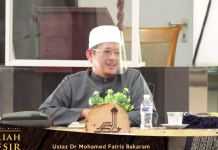This article is a summary of takeaways from Ustaz Dr Mohamed Fatris Bakaram’s Tafsir Online Lecture on 20th September 2020. Summaries of previous lectures on Surah Maryam and Surah Taha and Surah Al-Ambiya’ can be found here. This lecture is a continuation of the previous lecture on Surah Al-Mu’minun can be found here.
Continuation of Surah Al-Mu’minun
In the previous lecture, we had a look at the first four verses of Surah Al-Mu’minun which highlight the characteristics of the believers who are said by Allah SWT to have attained success. We will now resume to discover what are the other traits of a successful believer.
Those Who Guard their Private Parts
وَالَّذِينَ هُمْ لِفُرُوجِهِمْ حَافِظُونَ
And those who guard their private parts [23:5]
What this means is that a believer is someone who takes care of their sexual desires; a believer guards his desires when it comes to relations with the opposite gender. If you notice here, the word “furuuj” is used to mean ‘private parts’, a plural word is used rather than the singular “faraj”. This sentence refers to both the male and female parts, believers of both genders are asked to guard their private parts.
The word “hafizhun” is used to mean ‘to guard, conserve and protect’. What this means is that believers are not to give just anyone easy access to their private parts.
إِلَّا عَلَىٰ أَزْوَاجِهِمْ أَوْ مَا مَلَكَتْ أَيْمَانُهُمْ فَإِنَّهُمْ غَيْرُ مَلُومِينَ
except with their spouses or their slaves – with these they will not be blamed, [23:6]
So the first part of this sentence comes without question. A man’s wife is Sah and halal upon him, and a woman’s husband is Sah and halal upon her. In Islam, when a nikah has been performed, when the conditions have been met, when the rulings have been followed, then a couple becomes halal upon each other. This has been established since the time of Rasulullah SAW and is still in practice today.
The Abolition of Unacceptable Practices in Islam
What we are not used to dealing with is the second part of this verse. This verse states that a man’s sexual desires can be released upon the female slaves that he owns. Do we not live in a world where there is no longer slavery? What we can do is to read about these verses based on what facts have been known about them in history.
These verses have been revealed, and the message has been relayed by Rasulullah SAW, based upon what the circumstances, cultural practices, systems, and norms were at that point of time with the people of that time. At that point of revelation, slavery was something that existed; it had existed over generations for centuries. It was a reality that was very present at that point of time.
Abolition of Alcohol Consumption
When Rasulullah SAW came with the message of Islam, things that were unacceptable did not all completely come to an immediate halt. Some things were stopped through Allah’s Law in phases. We previously spoke about the forbidding of alcohol consumption. Drinking was an integral part of the Arabs’ culture; it was something that was not able to be stopped easily. So, its consumption was reduced in phases.
In the first phase, the companions of the prophet had been asked to focus on their Aqidah building, on purifying their hearts, and strengthening their belief. When their love of Allah had already been firmly established, the moment revelation came down regarding alcohol consumption, they were ready to take action that pleases Allah SWT.
In the first revelation regarding alcohol, Allah SWT stated that there is some good and some harm to alcohol, but the harm outweighs the good. At that moment, a portion of the companions already started to distance themselves from drinking alcohol.
After a period of time, the next revelation came, instructing the believers to abstain from drinking when the time of prayer arrived. The reason behind the revelation of this verse was that there was a companion who had been drunk during his prayer, and this caused him to get confused as he was reciting Surah Al-Kafirun.
As he was under the influence of alcohol, his memory and consciousness was impacted, leading to his reciting the verses wrongly as, ‘I worship what you worship, and you worship what I worship’. Revelation came down to instruct the believers not to come close to Salah whenever they were in the state of intoxication. Following this, the companions reduced their alcohol consumption further, breaking their patterns of addiction and intoxication.
After a while, Allah SWT revealed the final verse on alcohol consumption, calling it “filth that is a practice of Shaitan”. On that day, alcohol consumption became forbidden. At that point of time, the believers were ready to let go of this practice once and for all.
Alcohol consumption had already been removed from their daily habits and was no longer something that they heavily relied upon. The companions may not have been able to let go of alcohol immediately from the very start of their acceptance of Islam, but Allah SWT made it easy for them by introducing its prohibition in phases, making it less and less desirable until they were ready to completely eliminate it from their lives.
Abolition of Slavery
The same thing applied to slavery. However, the phases of elimination of slavery as a practice was something that spanned over a longer duration. Allah SWT did not reveal the verses prohibiting slavery during the life of Rasulullah SAW. It was a process that happened bit by bit across generations and centuries until we reached where we are today, where slavery is no longer an accepted practice.
In Islam, we have seen how Allah SWT had already encouraged the freeing of slaves through revelation. When people commit sins or broke agreements, they were asked to release slaves as a compensation. Even though there had been no verses revealed to ban slavery, the companions, encouraged by Rasulullah SAW, would compete with one another in spending their wealth on buying slaves just to free them. Eventually, slavery got abolished naturally.
We pray that in the future, there will not be a time where slavery returns as a norm in society. However, if, na’uzhubillah, this does happen again in the future, there are already laws in place within the revelation. In this verse, it states that a male believer can have intimate relations with his female slave. The inverse is not true for a female believer upon her male slave. I will not go into detail here, but there are many reasons for these which scholars have discussed in the text.
What is known in Islam though, is that if a female slave were to get impregnated by her master, then the birth of her child would be the price she pays for freedom. It is not suitable for a freed child to be born of a slave mother, so both the mother and child are free upon the child’s birth. As more and more women found freedom from slavery through this process, the number of slaves diminished overtime.
Permissible Sexual Relations in Islam
فَمَنِ ابْتَغَىٰ وَرَاءَ ذَٰلِكَ فَأُولَٰئِكَ هُمُ الْعَادُونَ
But whoever seeks beyond that, then those are the transgressors [23:7]
In Islam, sexual relations between male and females have been beautifully arranged in a way that suits our standing as human beings. Allah SWT says in Surah Al-Isra’,
وَلَقَدْ كَرَّمْنَا بَنِي آدَمَ
And We have certainly honoured the children of Adam [17:70]
Allah SWT tells us that we have been honoured. Honour is a right that we have, something that has been presented to us by Allah SWT. All the laws laid out by Allah SWT are therefore aligned with this honour. So, if you look at theses verses, there are two aspects to look at. On the surface, we see the boundaries laid out; there is no relationship outside of that with the spouse or the slave, whoever oversteps these bounds are transgressors.
On the other hand, we also see that in Islam, there are pathways that are encouraged by Allah SWT – pathways that are essential and endorsed by Allah SWT. In Islam, we do not say that anyone who wants to be honoured in Allah SWT’s eyes should not get married. No, rather the inverse is true. Getting married is a sunnah, a form of worship.
Marriage is Essential and Encouraged in Islam
I have mentioned this hadith repeatedly in our sessions, the one in which one of three companions of the prophet declared that he was not going to get married so that he could be a better servant of Allah SWT. There was a misconception that getting married would take him away from his worship of Allah SWT, that getting married would distance him from his path to achieving Allah’s Redha.
When Rasulullah SAW heard about the statements of these three men, he said, “I am the best person, with the most Taqwa out of you, and I perform Salah at night, and I sleep. I fast on some days, and I do not fast on other days. I also get married.” Rasulullah SAW said:
مَنْ رَغِبَ عَنْ سُنَّتِي فَلَيْسَ مِنّيِ
“Whoever is displeased with my sunnah is not from my people.” [An-Nasa’i]
In fact, Rasulullah SAW has said that when a believer performs sexual intercourse with his spouse, it becomes a Sadaqah. I do not know if there is any other religion in the world that makes the releasing of one’s sexual desires to become something that is so honoured that it is considered a form of worship to Allah SWT – to the extent that Allah SWT rewards a person with the rewards of Sadaqah for being intimate with their spouse.
Islam: A Religion of Prohibition?
So, when we look at these verses, do not just look at them from the aspect of what is forbidden only. There is a portion of people who claim that Islam is a difficult religion, where there are a lot of things that are forbidden, where every little thing is haram.
There are many verses in the Qur’an, and we choose to look only at what is forbidden. How can we then say that Islam is a religion that forbids many things? For each verse that forbids something, there are numerous others that make things permissible for us.
Have a look at what is forbidden from consumption – we discussed this in a previous lecture – carcass, blood that flows, the flesh of swine… these are forbidden but there is so much out there that is permissible for us. All forms of plants, poultry, livestock, animals from the lands and seas… these are all made permissible for us.
You want to get married? Go ahead! Islam allows it and Rasulullah SAW encourages it as his sunnah. You are given the freedom to experience the joys, the delights, and the blessings of life as a husband and wife, there is no one stopping you from it.
It is encouraged as a form of worship to Allah SWT. Why is that not what we see? What we see instead is ‘this is not allowed’ and ‘that is not allowed’. This is so present so much so that people see Islam as a restrictive religion. Why is this so?
It is because we see the world through tinted lenses that are clouded by our human desires. We see the world through how it occurs to our desires; we listen with our desires, we read with our desires, we even recite the Qur’an with our desires.
As a result, we see the religion of Allah as one that is restricted and restrictive. The truth is that Allah SWT, the owner of this religion and the owner of us, is a God who is Al-Waasi’, the All-Embracing, The Boundless.
He is the one who fulfils our every need and arranges the laws that put our lives in order and eliminates chaos and disorder through setting boundaries for us. These laws are not meant to restrict us, they are meant to allow us to live a life that works.
Those Who Take Care of their Trusts and Promises
وَالَّذِينَ هُمْ لِأَمَانَاتِهِمْ وَعَهْدِهِمْ رَاعُونَ
Those who take care of their trusts and their promises [23:8]
The word “Raa’uun” means ‘taking care of’. The word “Amanaat” refers to things that have been entrusted upon us to take care of, things which have become our responsibility. So, in Islam, it is Wajib upon us to take care of our trusts and our promises. Most of you would have heard of the following hadith before:
آيَةُ الْمُنَافِقِ ثَلاَثٌ إِذَا حَدَّثَ كَذَبَ وَإِذَا اؤْتُمِنَ خَانَ وَإِذَا وَعَدَ أَخْلَفَ
“The signs of a hypocrite are three: Whenever he speaks, he tells a lie; whenever he is entrusted, he proves dishonest; whenever he promises, he breaks his promise.” [Bukhari]
In another hadith, Rasulullah SAW says:
لَا إِيمَانَ لِمَنْ لَا أَمَانَةَ لَهُ وَلَا دِينَ لِمَنْ لَا عَهْدَ لَهُ
“He who is not trustworthy has no faith, and he who does not keep his covenant has no religion.” [Al-Albani]
Trusts
An Amanah is a trust that becomes wajib upon us to fulfil, something that is entrusted upon us by someone else, something that is imposed upon us. A promise is a commitment that we entrust upon ourselves, a word that is given to others, that is made obligatory upon us, by ourselves. So, whether a responsibility is placed upon us by others, or if it is placed upon us by ourselves, it becomes obligatory upon us to fulfil them.
An example of an Amanah is the trust that Allah SWT gives to a husband, that makes it obligatory upon him to take care of his wife well. As for the wife, Allah SWT places upon her the responsibility of ensuring that the husbands needs are well taken care of, that he is treated with love and that they are able to live in harmony. This is their responsibility. Their children become an Amanah upon them. It is Allah SWT who entrusts this responsibility upon them.
It is interesting to note that the word “Amanaat” used is plural whereas the word “‘Ahd” is singular. Why do you think this is so? Because Amanah are trusts given to us by other people. There are various multiple roles, obligations and duties given to us by the various people in our lives. Amanah cannot be avoided, it is what is given to us. Sometimes we pretend not to know about them. We overlook our own duties and responsibilities.
As a believer who wants to succeed, you need to remember that you already have a lot of Amanah to fulfil. Do what you can afford to do. Allah SWT is not Zhalim (cruel), He will not force you to do what you cannot do. Rasulullah SAW says in a hadith:
وَمَا أَمَرْتُكُمْ بِهِ فَافْعَلُوا مِنْهُ مَا اسْتَطَعْتُمْ
“Do that which I command you to do to the best of your capacity.”
Take on and do what you have the capacity to do with the understanding and realisation that you already have a lot of Amanah to fulfil. This is why we said in the last lecture that we should not busy ourselves with that which is not beneficial, that which is in vain. If we allow ourselves to be easily distracted with whatever does not benefit us, then we will find ourselves unable to fulfil our responsibilities. Focus on fulfilling that which has been entrusted upon you.
Promises
When it comes to promises, the word used is singular. What we can take from this is that we should not make too many promises – one is enough. Restrain yourselves back from making too many of them. Remember we mentioned about Nazar? Nazar are promises to Allah SWT. Do not make it a habit to keep making promises to Allah SWT.
Do not go about saying “Oh Allah, if I get this, I will fast for three days”. If you want to fast, then do so! Do not make something that is by default not obligatory upon you, obligatory upon you. Promises are difficult to fulfil. Do not overburden yourselves.
This is a principle that we need to hold onto in our lives. People who succeed are those who uphold their responsibilities – people who can be trusted. Those who do not break their promises, those who do not promise what they cannot deliver, those who do not overpromise.
If you feel like you are only able to deliver something within two days, give yourself a bit of buffer time, tell your customer that you will deliver within four days. You do not know what will turn up and delay you slightly. Do not overburden yourself and find that you are unable to fulfil your promises. To succeed in this life, these are key ingredients you must have: you need to fulfil both your trusts and your promises.
Those Who Take Care of their Salah
وَالَّذِينَ هُمْ عَلَىٰ صَلَوَاتِهِمْ يُحَافِظُونَ
And who guard their prayers;- [23:9]
Let us do a bit of recap on what we have learnt thus far based on Surah Al-Mu’minun. These are the characteristics of someone who is successful in Allah’s eyes: (1) Iman, (2) Khusyu’ in Salah, (3) Avoiding Laghwi (unbeneficial things), (4) Carrying out Zakat, (5) Controlling sexual desires, (6) Fulfilling one’s trusts and promises, (7) Guarding one’s Salah
Now these are the characteristics of a successful believer. If you notice, after faith, the first factor mentioned is Salah. The final factor mentioned is also Salah. The first and the last thing that should be taken care of is the Salah. All the other characteristics are included within the Salah.
This is why Rasulullah SAW says that the first thing that would be questioned about on the Day of Judgement is your Salah. If your Salah is settled, then the rest of your deeds will in syaa Allah be in line. However, if your Salah is not well maintained, there will probably be issues in maintaining your other worship as well.
The Two Mentions of Salah
What is the difference between characteristics (2) and (7)? (2) has to do with Khusyu’ in Salah, while (7) has to do with taking care of the Salah. What do you guard and take care of in Salah? You take care that you do not miss your prayers, you mind the timing, you ensure that you meet the conditions and pillars of Salah.
Notice that in Verse 2 of Surah Al-Mu’minun, Allah SWT says, “fii Solaatihim”, whereas in Verse 9, Allah SWT says, “‘alaa Solawaatihim”. There are two differences in this. First is that the word for Salah is singular in the former and plural in the latter. That means that for Khusyu’ it is to be found in each individual Salah. When it comes to protecting and taking care of the Salah though, all of the many prayers need to be taken care of; none of them should be left out.
Next, the word “fii” meaning ‘in’ is used in the former, while in the latter, the word “‘alaa”, meaning ‘on’ is used. You have Khusyu’ in your prayer, this is something that comes from within you, from deep within your heart – it comes from your internal spiritual, emotional being. On the other hand, you take charge by being on top of your prayers. You are the one who monitors, supervises, and controls your Salah.
Khusyu’ in Salah was mentioned first, whereas guarding your Salah was mentioned last. Which would be more essential in your success? Which will have a bigger impact on the state of your heart and spirit? Which will make the bigger difference? When you compare the impact between controlling your internal state within Salah, and controlling your external actions in managing your Salah, it is clear which comes first.
What is more important is the internal state. Let us be shaped by the Salah. Salah fills us, it embraces, and surrounds us. Surrender yourselves completely to Allah, lose yourself to Salah. Let your internal state be transformed by Salah.
Khusyu’ in Salah is most important, but guarding your Salah is also important. It is the basis of Salah. When we carry out our Salah, we tend to always focus on what is external. At times, we even get into arguments and quarrels about it; where should I position my hands, what du’as should I recite, is there a Qunut in Salah? All of these arguments bother us up to the point that they even distract us from the Salah – to the point that our Khusyu’ is disrupted. So, we need to ensure that our focus on what is physical does not interfere with what is internal and spiritual.
Those Who Inherit Paradise
أُولَٰئِكَ هُمُ الْوَارِثُونَ
These are indeed the inheritors – [23:10]
الَّذِينَ يَرِثُونَ الْفِرْدَوْسَ هُمْ فِيهَا خَالِدُونَ
Who will inherit Al-Firdaus: they will dwell therein (for ever). [23:10]
These successful believers will not merely inherit from this world. Rather, what they will inherit is worth way more than all the world. These people will inherit Jannatul Firdaus, Rasulullah SAW says that Al-Firdaus is the Paradise that is in the centre of all the Paradises and it is the highest of Paradises in status and position. This is where the successful believers will be, living in there forever.
Usually, when we talk about inheriting, we mean getting something from someone who has passed away. We may inherit a few thousand dollars from our family members. Our fathers may have sacrificed their blood, sweat, and tears working hard for us to build up their savings, and when they pass on, we might inherit a portion of it. That portion that we get would not last very long. Especially considering that it was not retrieved out of our own efforts. When it comes to wealth of this world, it does not last long.
What Allah SWT promises us here though, is that we will inherit Paradise – and we will have it with us forever. What does forever even mean? Can we really live eternally? Only Allah SWT knows how long that would be. What we know is that it will last way longer than anything does in this world.
An Undeserved Gift
Allah SWT does not say that we will ‘receive’ Paradise, Allah chose the word ‘inherit’. How can we inherit from Allah? We usually inherit from what is left behind, from someone who is no longer around to own his own property. Why does Allah use the word ‘inherit’? It is because we do not earn an inheritance, there is no effort that we put in to deserve getting it. It is as though it is given to us for free.
We inherit from our father just because we happen to be related to our father. Yet we fight for the wealth that is “rightfully ours” to inherit. At times, we hear about children fighting with the mother over their rights to inheritance when the father dies. They leave their mother homeless and neglected after forcing her to sell off her house just so they can get their portion of inheritance.
The wealth that they fight so hard to inherit, is not wealth that they themselves have put in effort to attain, the father earned the wealth and they just inherit it. They should feel ashamed for being so greedy in fighting over that which was not earned out of their own efforts.
Likewise, Allah SWT is giving us an inheritance not because we deserve it. It is not a reward for our efforts. A servant of Allah SWT cannot say that “I have done Salah, and Zakat, and fasted this many days, I deserve this reward; it is mine to receive”. You should be ashamed of such a statement.
How can you ever think that your deeds are enough to earn rewards from Allah SWT? You only perform Ibadah for a portion of your lives here on Earth. And even if you tally up all the deeds that you have done in your lifetime, do you think it will be enough to compensate for the blessings of this world? Far from it! What more for the blessings of the Hereafter? How could we possibly earn Paradise?
We cannot earn Paradise out of our own deeds and actions. Allah SWT will give us Paradise out of His love for us because He SWT is pleased with us, because He appreciates our obedience of Him. Our price for Paradise is Allah SWT’s Mercy upon us. That is why we are said to inherit from Allah SWT. It is not because we earn it but because Allah SWT presents it to us.
We inherit from our father because he thinks about us. He wants us to benefit from him even after he dies because he loves us. If he did not care for us, he would have spent all his wealth away, not saving a single cent left for his children and spouse. If he only thought of the work and hardship that he had put into earning that wealth, he would not have let us get even a single cent of it – because we did nothing to earn it. Our inheritance is our father’s final gift of love to us.
Allah SWT wants us to inherit Paradise. He tells us how to achieve that through these 11 verses. There are only seven characteristics of a successful believer. If Allah SWT did not think we could do it, He would not have asked it of us. It is doable and the reward is attainable. It is just a matter of how much you want it and how much you are willing to sacrifice for it.
Of course, you will not be able to fulfil all of it to perfection, to the fullest completion – we are human beings, not angels! Do what you can, to the best of your ability. And in syaa Allah, Allah SWT will make us amongst the inheritors of Paradise. May Allah SWT make us amongst His Servants who deserve to enter Paradise because Allah SWT loves and treasures us, because He sees our gratitude and Taqwa, because He is pleased with us.
May we meet again in the next session. Ameen.
——————–
Summary by: Arina Adom
Arina Adom is a lover of learning who takes on the world with an open mind. Resourceful and adaptable, always ready to take on new challenges. Comfortable working with diverse groups of people, yet able to work independently. Thrives under pressure. Currently seeking a meaningful career that enables her to impact lives directly and bring about positive changes in the lives of others in the community.
Arina graduated with a degree in Science ( Hons ), Life Science from NUS. She is currently taking a diploma in Quran and Sunnah Studies from Al Zuhri.
Watch Kuliah Tafsir again at
Masjid Darul Makmur’s Youtube
Watch and follow Kuliah Tafsir weekly
every Sunday after solat Maghrib

organised by Masjid Darul Makmur
Your contributions are appreciated. Get more details by clicking the image below.











